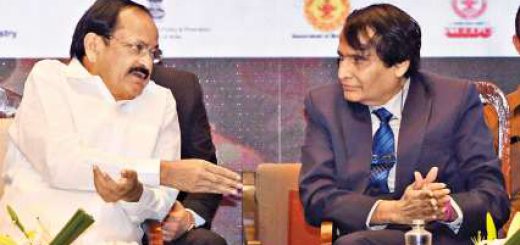Judges’ job to decide cases, not appoint brethren: Govt to SC
Supreme Court of India
WITH a terse statement that the job of judges is to decide cases and not appoint their brethren, the government on Tuesday defended before the Supreme Court replacing the collegium system of appointing judges with the National Judicial Appointments Commission (NJAC).
Even as the court identified “some unworkable situations” in the way NJAC is expected to function while hearing a batch of petitions that challenged the validity of the Constitutional amendment and the corresponding NJAC Act, the government was categorical that “the time has come for a change in the system of appointing judges”.
Defending the government action, Attorney General Mukul Rohatgi told a three-judge bench: “I dare say that the job of the judges is to decide cases. It is not their job to appoint their brethren. It cannot be said to be a facet of the independence of judiciary that judges must appoint fellow judges.”
“Lok Sabha approved NJAC with a vote count of 367-0 and Rajya Sabha passed it with 187-1 vote. It therefore shows the will of Parliament and the will of people. Twenty states ratified the Constitutional amendment and it doubly reassured us that what we, as a government, are doing is right,” he said.
Arguing before a bench of Justices Anil R Dave, J Chelameswar and Madan B Lokur, the AG said the government did not want a collision with the judiciary but it definitely wanted best persons to be appointed as judges.
Rohatgi pointed out that collegium system was often criticised for not being sufficiently transparent and open. “Sun light is the best disinfectant. The criticism of collegium system should also be kept in mind. No system is perfect and no system should be permanent. System must change and a time has come to change the current system of appointing judges. Everything in evolving, world is an experiment and we would want to go ahead with this experiment,” he said.
The AG sought to assure the bench that NJAC “will in fact strengthen the judiciary” and the court should not pay heed to an “alarmist picture” attempted to be painted by the petitioners as they claim a bad blood is bound to happen between the judiciary and the executive and that the latter would try to veto out the judiciary.
As the court proceeded to adjourn the hearing for Wednesday, Rohatgi made it clear that the government was vehemently opposing any plea to restrain it from going ahead and notifying the NJAC that would put an end to the collegium system since it was the will of Parliament, which had absolute power to legislate.
Earlier, the bench noted an “unworkable” scenario in the functioning of the NJAC, for it sought to keep out from deliberation the judges who are in the zone of consideration to be appointed as the Chief Justice of India.
The NJAC will be a six-member body, headed by the Chief Justice of India, that will also include the two senior-most Supreme Court judges, Union Minister of Law and Justice and two “eminent persons” nominated by another panel comprising the Prime Minister, CJI and Leader of Opposition in the Lok Sabha or leader of the largest opposition party in the Lower House.
The court underlined that the senior-most judge would ordinarily be in the zone of consideration to be appointed as the next CJI but the NJAC Act prescribed for keeping such a judge out from the deliberation. Similarly, if the senior-most judge is scheduled to retire and he cannot be considered for the appointment as the CJI, the judge next in line cannot be involved since he would be in the zone of consideration. “This presents a very unworkable situation. It looks like not a workable situation under the Act,” observed the bench.
Representing petitioners, senior advocates Fali S Nariman, Anil Divan and Bhim Singh also referred to a provision stating no appointment could go through if any two members oppose such cases. “Therefore, the collective opinion of the three judges can anytime be vetoed out by any two members and this itself is enough to show judiciary’s independence will be drowned. There have been nine judge-bench judgments giving the CJI primacy in appointing the judges and the government now seeks to nullify it without going through the legal process,” they argued.
Rohatgi responded that there was no basis to raise such apprehensions. “There can also be difference of opinion among the three judges. And then everyone is equal under the Constitution and in the eye of the law. Therefore it is not right to say it is alright if the Law Minister’s opinion is rejected by the judges but it will amount to interfering with the independence of judiciary if the judges’ opinion is not accepted,” he said.
Source:: Indian Express









